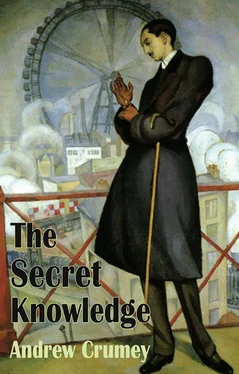Only way the policeman could have connected those seditious messages with Conroy was if his name was on them. So he searches for himself, just like he did with Laura, and the result is the same. He isn’t there. A thousand near-matches, namesakes from all around the world: dentists, lawyers, accountants advertising their existence and expertise, but the pianist is gone, wiped like his lover. Conroy hurriedly extinguishes the page as the assistant returns, tells him he’ll think about it, but what he’s really considering is his own non-being, the impossibility of proving innocence when all evidence of supposed guilt has been removed.
He returns to his flat, only a matter of time before they come for him there. Climbing the bare common staircase that smells of piss and cider he reaches his front door, dented by pursuers of a former resident. The lock feels loose when he turns the key, as though someone might have tampered with it. Stepping inside he immediately senses another presence, and in the living room he finds it. On the battered sofa sits an elderly lady.
“Hello, dear,” she says.
“Who the fuck are you?”
“My Pixie can’t keep herself out of mischief, always roaming about.”
“Your cat?” Conroy drops onto the armchair and looks at the genial silver-haired woman in her pale blue cardigan and large-beaded necklace. “How did you get in?”
She smiles. “You left the door wide open, I suppose Pixie came to inspect.”
What’s he supposed to do, offer her tea? “Where’s Pixie now?”
“Gone back upstairs, I expect,” the lady says unconcernedly, then from the pocket of her cardigan she takes a pack of playing cards, larger than normal so that at first he doesn’t recognise what they are. She fans and holds them out in her tremorous hand. “Take one.”
“What the hell is this?”
“Go on.”
He does as she says, slides out a card and looks at it. The picture is like an old woodcut, hand-coloured, with the word Pyramide printed elegantly beneath a picture of an Egyptian monument.
“Show me what you picked.”
He turns it towards her. “Are you going to tell my fortune?”
“It signifies wisdom.”
“Who are you? This is about those students, isn’t it?”
“Ancient knowledge, a great secret.” She holds out the pack again so that he can choose another card. It shows a naked man and woman, Adam and Eve, with the inscription Jardin .
“A couple, a meeting,” the lady explains. “Perhaps a fall.”
Next he must take two cards, he consents with increasing bemusement but that changes instantly when he sees what they are. A pair of figures in mediaeval costume; one a stonemason, the other a glass-blower. The titles are Pierre and Verrier .
“Who put you up to this?”
“Stone denotes strength and fortitude, glass stands for great prospects or an auspicious discovery.”
“Where did you get these cards?”
“I suppose I should go and see what Pixie’s up to now…”
“How do you know about the secret knowledge?”
“Oh, I don’t know any more about it than you do, dear.”
She passes him the rest of the pack and Conroy begins to look through the cards. From their condition they seem recently made though the style of illustration is archaic; he supposes them to be a sort of tarot deck. One card shows a simple leather shoe and is called Oeillet , another that attracts Conroy’s attention has a rose bush in full bloom; he gazes at the blood-coloured flowers and a memory stirs in his mind.
“Rosier.”
“Usually it means faith and purity.”
“The people Laura was investigating.”
“I’d really better go and see what that little rascal of mine’s up to, would you like to keep the cards a while longer?”
Conroy nods silently, dumbstruck by revelation, while the lady tries to raise herself from the sagging sofa, making the effort several times until Conroy notices and reaches to help lift her, then she totters away, muttering to herself about the cat. Conroy hears the front door close and stares at the cards piled in his hand. The Rosier Corporation, that was what Laura called it. He needs to find out more but if he leaves again he’s sure to be spotted by the man who’s been following him, too risky even going to the window to check. So Conroy waits, immobile like an insect beneath a stone, watching the slow change of daylight and feeling the empty hours push shadows slowly across the walls of the room.
Must have fallen asleep because now it’s dark, his body wooden like the old lady’s, wrecked and invisible. The cards are gone, they aren’t in his hand or lap or on the floor at his feet, as if she came back for them. He strains upright, sways with sleep still clinging to him, the sky outside livid again with night colour, purple and orange. He goes and looks down from the window and no one’s there, they’ve given up. Safe to go out and find food.
Half an hour later he’s walking in drizzle eating chips by the handful, throws the half-full container in a skip. Two women are having a drunken argument in front of a kebab shop, it stands next to the pallid glow of a place calling itself an internet café, white-walled room where a couple of foreign-looking youths sit staring at screens as a refuge from boredom. Conroy goes inside, buys a coffee from the machine, takes a seat and pays the access fee. The police can easily find him here but he doesn’t care.
“Hey, darling.” It’s one of the women, standing unsteadily in the doorway and leaning on its frame for support, tits palely bulging like old lard. His stare unnerves her, a reminder of the state they’ve both let themselves fall into, though it doesn’t sink in at first, instead she simply looks puzzled. Conroy imagines the scene if she was beautiful and sober, he anything but a loser, imagines it so clearly that he feels transfigured, wants to tell her about his secret mission, take her on the run with him. Instead he stares until she sneers back at him, “Fuck off,” and waddles out of sight.
He wants to find out more about Rosier, begins typing but is soon interrupted.
“David?”
Must have been standing silently behind Conroy for some time. Dark jacket and tie, shirt a deep shade of burgundy, immaculately trimmed hair, olive skin. A neat, theatrical appearance like a stage hypnotist.
“You’ve been following me.”
No one else in the internet café, the two slouching youths have left while Conroy was staring at the screen. There’s only himself and the guy.
“Who are you?”
“Call me H.”
“Are you with the police? The Corporation?”
H says nothing, draws up a chair, the only sound the whirring of computer fans and a distant siren outside.
“You’ve come to erase me, same as you did to Laura.”
“You shouldn’t have stopped taking your medication.”
“That’s not how this started.”
H nods thoughtfully. “Who can say where anything begins or ends?” He reaches into his jacket pocket, brings out a fine silver chain, holds one end and lets it hang for Conroy’s inspection.
“Laura’s.”
“Something I found.” H twirls it in his fingers. “Where’s the first link? Top, bottom, somewhere in the middle? Is what happens today caused by whatever occurred yesterday; or might events be explained by something still to come? You’re a musician, you understand how everything leads to a final chord, a cadence, perhaps a resolution.”
Conroy looks round towards the door and sees only darkness and emptiness beyond, as if the city itself has been obliterated. “You’re not real. None of this is real.”
“For example, think of some of your favourite piano compositions. Where does Kreisleriana end? Not the final note, that’s for certain, it’s still playing inside your head. Or the ‘Hammerklavier’ Sonata? Beethoven finished the whole thing and sent it to the publisher, then at the very last moment he decided to add a single bar at the opening of the slow movement. We hear it in the middle when really it’s the conclusion — or beginning.”
Читать дальше











